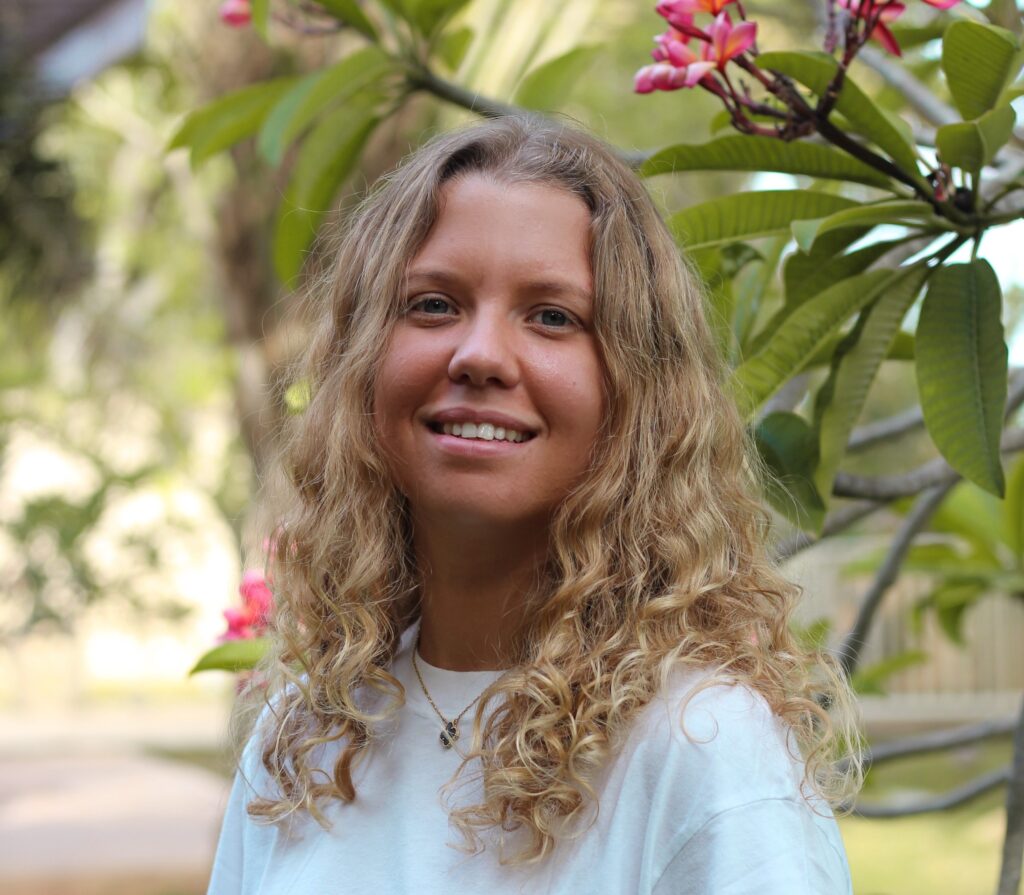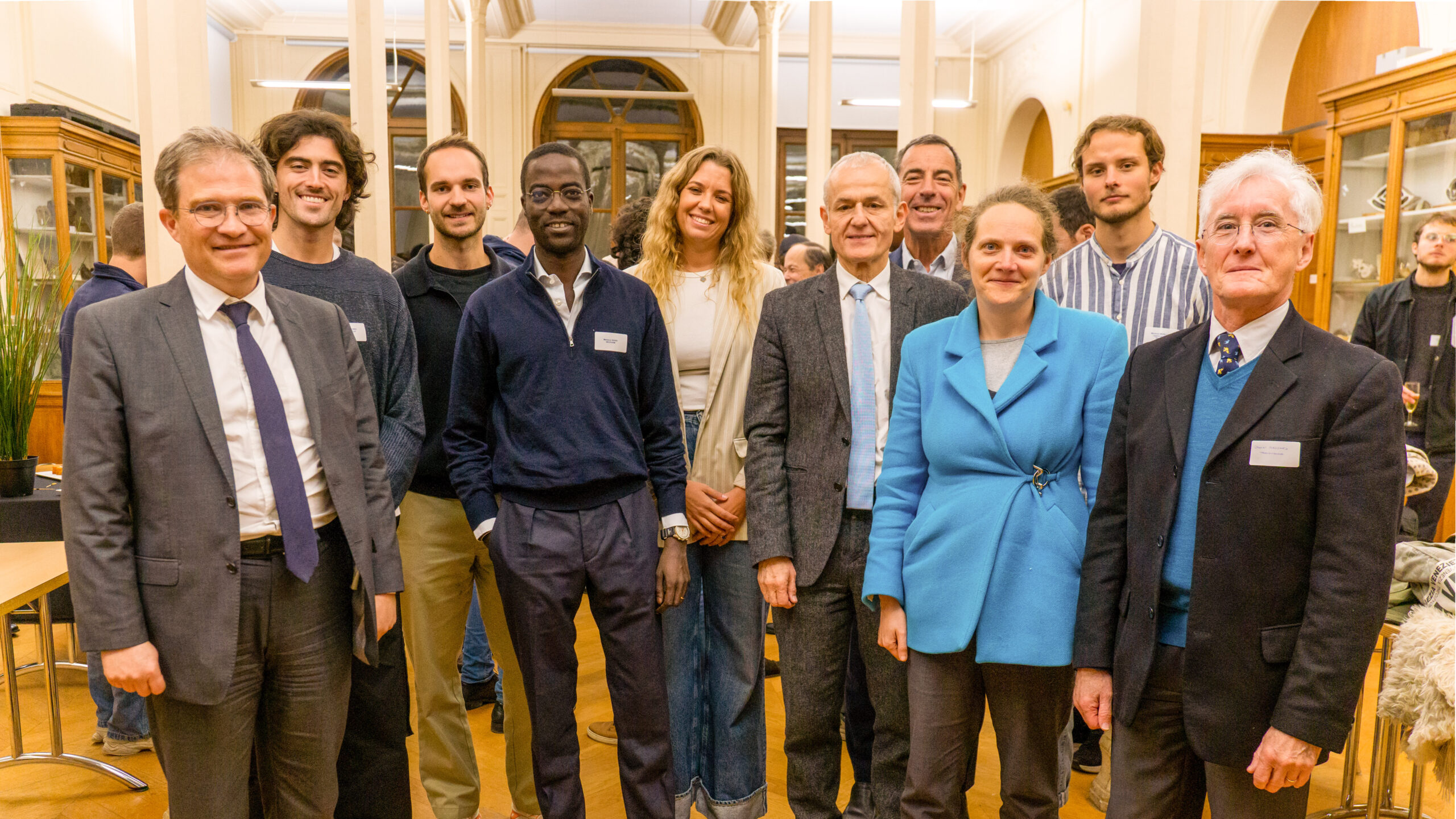Awarded a prize in the 2024 edition of the Mines Paris – PSL – Transvalor Entrepreneurship Prize organized by the Mines Paris Foundation, Julie is a graduate of theInstitut Supérieur d’Ingénierie et de Gestion de l’Environnement, (ISIGE 2018-2019), a course dedicated to environmental issues. With her partner Mansour Niang, she has developed a model that tackles the crucial challenges of resource management and food security in Africa. NeoFarm valorizes organic waste using Black Soldier Fly larvae, which produce animal proteins and organic fertilizers, essential for sustainable agriculture in Senegal.
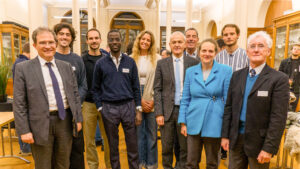
Mines Paris – PSL – Transvalor Entrepreneurship Awards Ceremony on Tuesday December 12.
NeoFarm’s success is based on its complementarity: Julie brings her expertise as an environmental engineer, while Mansour, a specialist in business strategy and management, is responsible for the company’s development. Their pilot unit in Dakar has become an example of a project that reconciles economic efficiency and environmental benefits.
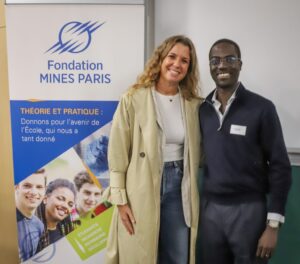
Julie Crémieux and Mansour Niang
Julie is a perfect example of how training at ISIGE Mines Paris – PSL can transform ideas into high-impact projects. The program, which is resolutely focused on environmental issues and sustainable transitions, provides students with the tools to analyze, design and implement innovative solutions to today’s ecological challenges.
Interview with Julie Crémieux
What moments during your time at ISIGE influenced your decision to launch NeoFarm?
I’ve always been driven by the desire to get involved in projects with a strong social and environmental impact, which is what motivated my decision to enroll at ISIGE. This experience proved decisive in the launch of NeoFarm. By observing the potential of the agri-food sector in West Africa and the many issues that surround it, I was able, thanks to lessons on the circular economy and waste management, to learn to perceive bio-waste as a valuable resource. In addition, collaborative projects with companies and lectures by committed entrepreneurs inspired me to develop a concrete solution to environmental and food challenges, particularly in Senegal. Finally, ISIGE gave me the tools, vision and confidence to transform an innovative idea into a meaningful and impactful entrepreneurial project.
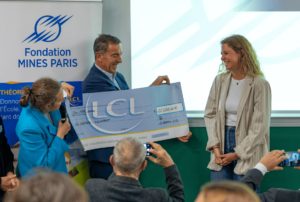
As winner of the Prix Émergence Jeune Entreprise, what does the recognition brought by this award mean to you, and how do you see the impact of this distinction on NeoFarm’s development?
The recognition provided by the Prix Émergence Jeune Entreprise is first and foremost a validation of the work we’ve accomplished and the vision we have for NeoFarm. This award highlights the importance of innovative solutions like ours to meet environmental, social and economic challenges, particularly in West Africa, the region of the world recording the strongest demographic and economic growth. It is also a strong encouragement, reinforcing our determination and that of our team to pursue our mission. In terms of NeoFarm’s development, this award acts as a gas pedal: it gives us high visibility, helps us establish strategic partnerships and strengthens our credibility with our investors, partners and customers. This prize is not just a reward, but an essential lever in NeoFarm’s development.
Mines Paris – PSL – Transvalor Entrepreneurship Award ceremony on Tuesday December 12, organized by the Fondation Mines Paris.
Why did you choose to set up NeoFarm in Dakar, and what are the main local challenges you face?
We chose to locate NeoFarm in Dakar because of its strategic position in West Africa. As the region’s economic hub, Dakar offers an ecosystem conducive to innovation. Technically, this location also makes sense, as the local environment, with its ideal year-round temperature and humidity, is perfectly suited to the reproduction of the black soldier fly (BSF), a central pillar of our business.
Beyond the strategic and technical aspects, this project has a personal dimension for us. Mansour, my co-founder, and I were both born and raised in Dakar before pursuing our studies between Europe and the United States. We were particularly keen to return to Senegal to create a meaningful project that would have a positive impact on our country.
The Black Soldier Fly is at the heart of your model. What opportunities does this biotechnology offer for meeting global challenges?
The Black Soldier Fly (BSF) is a revolutionary biotechnology that offers unique opportunities to meet a number of challenges. First and foremost, it offers an effective and sustainable solution for biowaste management. Thanks to its ability to transform organic waste into a protein- and lipid-rich biomass, it reduces waste volumes while adding value.
The BSF larvae produced can be used as an ecological and local alternative to fish and soy meal in animal feed, helping to reduce pressure on marine resources and farmland. This model is part of a circular economy, where nothing is lost and everything is recovered.
Another key aspect is the production of frass, known as an excellent organic fertilizer. Rich in essential nutrients, frass improves soil fertility and promotes plant growth in an environmentally-friendly way, contributing to more sustainable agricultural practices and better soil management.
BSF offers an adaptable solution for regions hardest hit by the food crisis and environmental challenges, particularly in Africa. By producing protein and organic fertilizer locally, this technology helps to strengthen the resilience of food systems in the face of population growth and dwindling natural resources.
The black soldier fly is a powerful lever for building sustainable systems, reducing the environmental impact of food production and promoting the local economy.
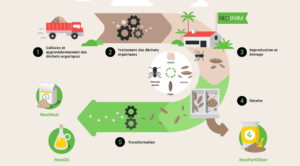
The NeoFarm process
What are your goals for scaling up and broadening the impact of NeoFarm in the coming years?
To scale up and broaden the impact of NeoFarm in the coming years, we have several key objectives. The first objective is to validate our industrial model by starting with the processing of 10 tonnes of organic waste per day, enabling the production of 200 tonnes of dried larvae and 1,000 tonnes of frass per year. Once this first phase of the industrial model has been validated, we aim to gradually triple our production capacity, making NeoFarm a key player in the sustainable protein and organic fertilizer industry in Senegal.
At the same time, we want to extend our model to other West African countries. We have two options for this expansion: either to replicate our model by creating subsidiaries, or to sell our technology in the form of franchises, which would enable us to disseminate our solution more widely.
We also intend to diversify our business model by including the sale of black soldier fly eggs. This service will particularly appeal to small-scale breeders and farmers generating moderate volumes of waste, offering them the opportunity to learn how to grow and process larvae, while producing protein for animal feed and fertilizer for their crops. In addition, this will enable them to outsource fly reproduction, a technically complex and costly process to implement on a small scale. This approach enables us to outsource larval growth and waste management, particularly for waste sources located more than 30 km from our industrial unit. Thanks to this strategy, we reduce transportation costs by favoring the transport of eggs, which require less space and logistical investment than organic waste.
These initiatives are essential to scale up and broaden NeoFarm’s impact, consolidating our market position and accelerating the transition to a circular, sustainable and local economy in West Africa.
As a woman entrepreneur and graduate of the Ecole des Mines, what message would you like to pass on to students interested in sustainable innovation?
As a woman entrepreneur and graduate of the Mines engineering school, my message to students interested in sustainable innovation is to dare to dream big, to be bold in your projects and, above all, to believe in your ability to make a difference. Sustainable innovation is not just a career path, but also a mission that enables us to meet global challenges while having a positive impact on society. It’s essential to dare to think outside the box, to commit fully and to develop innovative solutions to the challenges we face.
Don’t be discouraged by obstacles, because every challenge is an opportunity to learn and grow. Finally, never underestimate the importance of being well surrounded: associates, mentors, partners etc., because ambitious projects require strong, passionate teams. Let yourself be inspired by the conviction that you can contribute to a fairer, more sustainable future, even on a small scale, because every step counts.
Julie’s award highlights the importance of sustainable entrepreneurship. Her career path illustrates how Mines Paris – PSL trains entrepreneurs capable of tackling complex challenges while having a positive impact on society and the environment.
